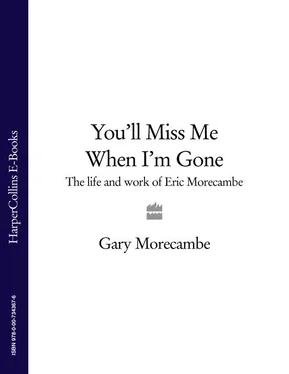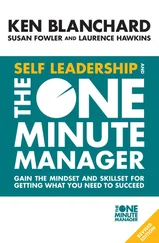I can’t say more really. It’s fantastic that they still remain at the top of any journalist’s list of funny people now and in days gone by. God bless him.
RONNIE CORBETT OBE
12 June 2008
PART ONE: Remembering Eric
INTERVIEWER: Some say you never mix socially. Is this true?
ERIC: It is true, and it isn’t true. The point is, if we have to mix socially we will. If we don’t, we don’t. That’s what has helped to keep us together such a long time.
ERNIE: People seem to think the image extends from the stage…like Laurel and Hardy.
This almost certainly being the last book I will ever write on my father, Eric Morecambe, I want to put down a few words about the man from a personal standpoint.
A family Sunday lunch conversation was taking place in the Morecambe household circa 1970. We were discussing, in far from dulcet tones, as was the way when my father was about, various ideas he had for his next Christmas show. Not unnaturally we were all eager to chip in with our own ideas. Finally, beneath the hum of voices, my father, in his familiarly loud tones said, ‘Be quiet, everyone. Gary’s got something to say, and every now and then it can be interesting!’
I cannot recall for the life of me what I then suggested that long-ago day, but hopefully this book—commemorating the twenty-fifth anniversary of the great man’s passing—is the ‘now and then’ when I can be interesting.
Some observers of past books to do with family relationships where fame is
present, including one publication of my own, appear to misunderstand the whole concept of consigning to print the personal experiences and events of their life around that fame. Friend and erstwhile colleague, the late Michael Sellers, son of one of my own personal heroes, Peter Sellers, wrote a very compelling biography of his father in the early eighties called PS: I LoveYou. At the time he was put under a lot of pressure for having made ‘slanderous’ comments about his father and generally trawling for dirt—neither of which he did! He simply told the story in a very honest and balanced way. The misconception, therefore, is that the author is always out to trawl for dirt and not simply aiming to define the image of the parent of public interest as they, the author, experienced it.
Therefore, whatever you might read into my words, rest assured of one thing: Eric Morecambe is still my icon and the best father anyone could wish to have had.
Fortunately there is a big difference between Eric Morecambe and Peter Sellers when it comes to personalities, and I’m so very lucky that out of all the famous parents I might have had I got Eric! And it’s not whingeing or dirttrawling when I try to give the complete image of the man. It is providing an accurate account (as accurate as one person’s experiences and observations ever can be trusted to be) not only for his fans of today but also for those of future years.
As I say, I’m lucky because Eric was a thoroughly pleasant person to be around, who, in his own words, ‘never knowingly set out to hurt anyone’. His shortcomings and doubts as a parent were more to do with the extraordinary circumstances of his chosen career and the fact that that career made him absent quite a bit, specifically in my sister’s and my early years. Furthermore, it was an era when fathers were heard more than seen. In his case he wasn’t heard that much either, because most of the parenting was left to my mother, owing mostly to those protracted absences. This must have made it difficult for him—and her, come to think of it. Yet he did manage to connect with us so well. The comedy performer’s thing of touching the child within certainly is true: as soon as he was around there was little time wasted growing accustomed to who this man we called ‘Dad’ was. All at once he was just there, and joking around and communicating on our level.
‘Eric was a thoroughly pleasant person to be around, who, in his own words, “never knowingly set out to hurt anyone”.’
Occasionally he would act more seriously and there’d be the ‘How’s school going?’ question. I liked those questions, not because he was genuinely interested, because he wasn’t—it was an alien world for him and the wash of blankness over his face showed as much—but because he felt he should ask, and that was heartfelt and therefore warmly received.
I reflect on him as a performer who was absorbed by his work—a performer who saw his career as much more than a means to an end. This was probably detrimental to his health, but not to the extent claimed by certain documentaries, which casually gloss over the sixty fags a day and the ill-health he acquired working down the mines. But it is fair to state that his personality was not fully geared to the pressures that being on top of the comedy pile had in store. He
often claimed that being something just a little less than number one was best, because you had a great living without carrying the stress of public expectation. Having been in his company in public I would challenge that, as I got the impression that he very much enjoyed being number one. He certainly enjoyed being famous: a documentary by Jonathan Ross screened at Christmas 2007 confirmed as much when in a rare interview from the archives my father admitted to it without a moment’s hesitation. In fact, he went on to say that he didn’t believe other famous people when they said that they didn’t enjoy it.
I also sense with my father that he saw his success as a stroke of luck—something that prevented him having to do an underpaid, mundane job for a living. I don’t think I heard him ever knock his father, George, for spending a life working for the Corporation (local council), but equally he felt no urge to follow in his footsteps.
‘Fundamentally he just wanted to make us, his family, laugh and make the viewing public laugh too.’
I think, as we’ll see from the words of his old friends from Lancashire, that Eric was a little unusual as a child: clearly gifted, yet sometimes remote when he chose to be. All these friends seemed to expect him to go on to great things as if it were a given. His sharp wit, inability to deal with responsibilities and major decisions, and a temperament which made it difficult for him to be tolerant of all that everyday life threw his way would all have been a part of him with or without the recognition and success that followed. However, I would say that the nature of his work added to any stress he felt and contributed to his momentary mood swings. But, as I write these words, I know that fundamentally he just wanted to make us, his family, laugh and make the viewing public laugh too. He was somehow beholden to that need to entertain because it had freed him from an ordinary background, yet in the act of embracing it he
became imprisoned by it. That’s really all it came down to. All the other bits were just flighty little moments of everyday life—some days were good and fun and full of hilarity around the house, some days less so. All other expressions, desires and actions were hardly recognizable as anything more than minor character traits: there really wasn’t that much there beyond entertaining—it totally defined him and was virtually all he was seeking from life.
What helped damage his health was the incongruity that being funny was not—and probably isn’t for any comedian—delivered from a relaxed state of mind and body. As my mother once remarked, he could hardly sit down at the dinner table without having to get up and do something halfway through the meal. He was a bundle of nervous energy. This made him slightly contradictory, for while Morecambe and Wise was everything to him, he was also quite happy to point out clouds and make shapes from them, or to sit alone all day long on the river bank, surrendering to the moment and revelling in that childlike clarity of vision that was so much a part of his likeability.
Читать дальше








![William Frith - John Leech, His Life and Work. Vol. 1 [of 2]](/books/747171/william-frith-john-leech-his-life-and-work-vol-thumb.webp)
![William Frith - John Leech, His Life and Work, Vol. 2 [of 2]](/books/748201/william-frith-john-leech-his-life-and-work-vol-thumb.webp)


